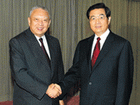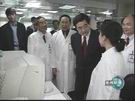 |
|
| China's leaders go all out to raise morale as SARS takes hold |
| CCTV.COM 2003-04-21 09:04:58 |
|
As part of the global battle against the deadly Severe Acute Respiratory Syndrome, Chinese governments at all levels have made it a top priority to control and prevent the spread of the virus. With the whole communities mobilized, President Hu Jintao and Premier Wen Jiabao have made several high-profile visits to affected areas to show solidarity with medical workers and the public.
 On top of his busy schedule, Chinese President Hu Jintao made a trip to south China's Guangdong province on April 10 for a five-day inspection tour of the region where the first SARS case was reported. On top of his busy schedule, Chinese President Hu Jintao made a trip to south China's Guangdong province on April 10 for a five-day inspection tour of the region where the first SARS case was reported.
On April 12, during a scheduled meeting with Tung Chee-hwa, chief executive of Hong Kong Special Administrative Region, the Chinese president expressed his concern over the SARS situation in Hong Kong.
Two days later, he visited Guangdong Disease Prevention and Control Center, where he held discussions with representatives from 23 local hospitals to gain first hand information about SARS-related problems. The president was also briefed by officials from local government departments.
 After learning two local hospitals reported that no medical staff have been infected with the virus, the Chinese president urged all to take their expertise to other hospitals. He stressed that the well-being of medical staff is pivotal in the fight against the epidemic. After learning two local hospitals reported that no medical staff have been infected with the virus, the Chinese president urged all to take their expertise to other hospitals. He stressed that the well-being of medical staff is pivotal in the fight against the epidemic.
Meanwhile, in Beijing, Chinese Premier Wen Jiabao has been working on another front. On April 6, he was on a fact-finding tour of the Chinese Disease Prevention and Control Center to discuss a new disease control strategy with experts. Later on April 12, he paid a visit to Beijing Youan Hospital, one of several hospitals in Beijing specializing in SARS patients’ treatment.
 In a meeting with hospital staff, he expressed his gratitude for what they have done in preventing and treating SARS. He also delivered heartfelt thanks to the staff for sacrifice and hard work on behalf of the Central Committee of the Communist Party of China and the State Council. In a meeting with hospital staff, he expressed his gratitude for what they have done in preventing and treating SARS. He also delivered heartfelt thanks to the staff for sacrifice and hard work on behalf of the Central Committee of the Communist Party of China and the State Council.
On April 18, the Chinese premier also visited several Beijing kindergartens and schools to make sure adequate prevention measures were in place.
At the same time the Chinese government held a series of high-level meetings on the prevention and control of SARS. On April 2, Premier Wen Jiabao chaired an executive meeting of the State Council, highlighting the urgency of the battle against the epidemic.
Ten days later, addressing a national working conference on SARS prevention and treatment, Premier Wen said effective and powerful measures to prevent the spread of the virus and immediate treatment to ensure people's health is guaranteed.
 On April 14, during an executive meeting of the State Council presided over by Premier Wen, an initiative was endorsed to establish a national quick response mechanism to deal with public health emergencies. On April 14, during an executive meeting of the State Council presided over by Premier Wen, an initiative was endorsed to establish a national quick response mechanism to deal with public health emergencies.
According to the meeting, the quick response mechanism will be directed by the central government, with governments at various levels shouldering different responsibilities. The mechanism should have a strong legal framework, a sound monitoring system and adequate basic facilities.
The meeting also outlined urgent tasks for the establishment of the mechanism, such as promulgating relevant laws and regulations, improving information network, establishing a national and local disease prevention and treatment network and strengthening the medical force.
The Standing Committee of the Political Bureau of the Chinese Communist Party Central Committee, held a meeting on April 17 to discuss the further strengthening of control over SARS.
The meeting, chaired by General Secretary of the CPC Central Committee Hu Jintao, urged the CPC and government organizations at all levels to be fully aware of the extreme importance of SARS control and to treat it as a priority in their work.
The Standing Committee said that, despite remarkable progress in SARS control, the task ahead remains arduous and complicated given that SARS is a newly-discovered epidemic. It urged the continuous and relentless strengthening of SARS control to consolidate the successes and resolve outstanding problems.
The meeting urged composure, quick action, reliance on science, efficiency and the improvement of the control mechanism in the fight against the SARS epidemic.
It also pointed out controlling the spread of the disease is most important. And early discovery, early reporting, early quarantine and early treatment are keys to cutting off the epidemic's transmission route.
On many other occasions, top Chinese leaders reiterated frankly that the impact of SARS on tourism, transportation and trade as well as foreign relations will be inevitable. However in the long run, the situation will definitely be improved.
Though the spread of SARS has been partly under control, a lot more still needs to be done to prevent its further spread. The Chinese government is fully committed to sparing no efforts for the final success in the fight against SARS.
|
|
Editor: Han Ling CCTV.com
|
|
|
|
|
|
 |









